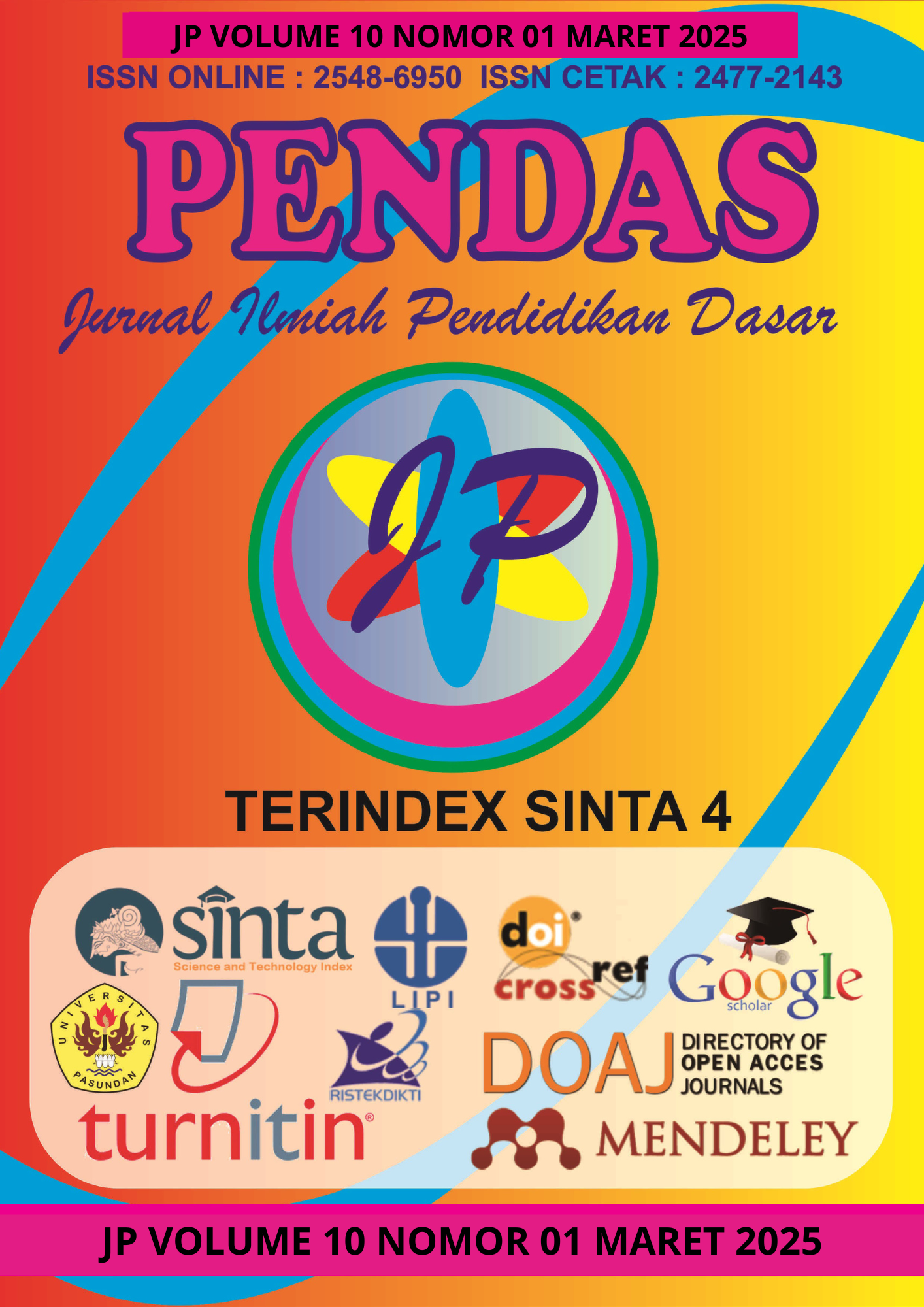PENGARUH PENDEKATAN TaRL TERHADAP HASIL BELAJAR IPAS KELAS VI B SDN PEDURUNGAN KIDUL 01
DOI:
https://doi.org/10.23969/jp.v10i01.21348Keywords:
learning outcomes, IPAS, TaRLAbstract
Students have various characteristics, including learning abilities. These differences result in them having different methods of receiving, interpreting and conveying information. Teachers can adjust teaching and assessment by paying attention to students' needs and abilities, one of which is by implementing the TaRL approach in the learning process. The purpose of this research is to determine the effect of implementing the TaRL approach on student learning outcomes in science learning. This research is a mixed method research. This research combines two methods, namely quantitative methods and qualitative methods to strengthen the results of the research. The subjects of this research were students in class VI B at SD Negeri Pedurungan Kidul 01 with a total of 23 students. The research instruments used to measure learning outcomes are pretest and posttest scores. The research design applied was one group pretest-posttest design. The data obtained was then tested using the normality test, paired sample t-test hypothesis test, and the N-Gain test. The research results showed that the average learning score of students before being treated with the TaRL approach was 45.56, while after being given treatment, this score increased to 85.47. The t test analysis with a significance level shows a value of 0.000, which is smaller than 0.05, indicating a significant influence. Apart from that, the N-Gain test result of 0.7421 is in the high category, which shows the effectiveness of implementing the TaRL approach. Based on the results of this research, it can be concluded that the application of the TaRL approach has a significant and effective influence on student learning outcomes, especially for students with a low initial level of ability.
Downloads
References
Hikmah, M. (2020). Makna Kurikulum Dalam Perspektif Pendidikan. Jurnal Pendidikan Dan Pemikiran, 15(1).
Iriani, E. (2019). Peningkatan hasil belajar siswa sekolah dasar menggunakan media kertas bergambar pada materi perkembangbiakan tumbuhan tema 1. Edubiotik : Jurnal Pendidikan, Biologi Dan Terapan, 4(02), 93–100. https://doi.org/10.33503/ebio.v4i02.505
Jauhari, T., Rosyidi, A. H., & Sunarlijah, A. (2023). Pembelajaran Dengan Pendekatan TaRL Untuk Meningkatkan Minat Dan Hasil Belajar Matematika Peserta Didik. 9(1), 59–74. https://doi.org/10.18592/ptk.v%vi%i.9290
Natzir, F., Auliah, A., & Bara, Y. (2023). Upaya Peningkatan Hasil Belajar Peserta Didik dengan Pendekatan Teaching at the Right Level (TaRL) melalui Metode Tutor Sebaya pada Pembelajaran Kimia.
Nur, A., & Suraya, I. (2024). Pengaruh Pendekatan TaRL Terhadap Hasil Belajar IPAS Materi Magnet Dilihat dari Tingkat Kemampuan Awal Peserta Didik Kelas V Sekolah Dasar. Jurnal Inovasi Pendidikan Sains (JIPS), 5(1), 1–8. https://doi.org/10.37729/jips.v5i1.4280
Rahayu, R., Rosita, R., Rahayuningsih, Y. S., Hernawan, A. H., & Prihantini, P. (2022). Implementasi Kurikulum Merdeka Belajar di Sekolah Penggerak. Jurnal Basicedu, 6(4), 6313–6319. https://doi.org/10.31004/basicedu.v6i4.3237
Rosyidah, A., Husniati, Widodo, A., & Khair, B. (2022). Persepsi Guru Terhadap Implementasi Pembelajaran Literasi Numerasi Pada Masa Pandemi Covid-19 Di SDN Darek Lombok Tengah.
Subagyo, A. (2020). Aplikasi Metode Riset: Praktik Penelitian Kualitatif, Kuantitatif & Mix Methods. Malang:Inteligensi Media.
Sugiyono. (2017). Metode Penelitian Pendidikan. ALFABETA.
Usmadi. (2020). Pengujian Persyaratan Analisis (Uji Homogenitas Dan Uji Normalitas). 7.
Yunita, Zainuri, A., Ibrahim, Zulfi, A., & Mulyadi. (2023). Implementasi Kurikulum Merdeka Belajar. Jambura Journal of Educational Management, 4, 16–25. https://ejournal-fip-ung.ac.id/ojs/index.php/jjem/index
Zulfa, L., Ermawati, D., Reswari, L. A., Guru, P., Dasar, S., & Artikel, R. (2023). Efektivitas Media Pembelajaran Berbasis Augmented Reality Terhadap Pemahaman Konsep Matematika Siswa SD Kelas V. 14(4), 509–514. https://doi.org/10.31764
Downloads
Published
Issue
Section
License
Copyright (c) 2025 Pendas : Jurnal Ilmiah Pendidikan Dasar

This work is licensed under a Creative Commons Attribution 4.0 International License.














































